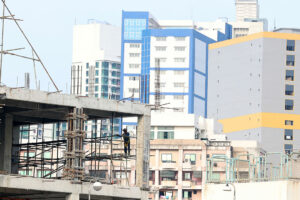




January Economic Update: Growth slows, prices rise
 DOWNLOAD
DOWNLOAD

Inflation Update: Up, up, and away?
 DOWNLOAD
DOWNLOAD

Quarterly Economic Growth Release: Growth takes on a slower pace
 DOWNLOAD
DOWNLOAD


Industrial sector still operating below ‘normal’ capacity

The Philippines industrial sector is still not operating at full capacity, Pantheon Macroeconomics said, though this has helped tame price pressures.
“Underlying price pressures in the Philippine economy remain contained in more ways than one. One main aspect is the fact that heavy industry is still operating below ‘normal’ capacity,” Pantheon Macroeconomics Chief Emerging Asia Economist Miguel Chanco said in a report.
The latest data from the Bangko Sentral ng Pilipinas’ (BSP) Business Expectations Survey showed that the average capacity utilization of the industry and construction sectors edged lower to 71.9% in the third quarter from 72% a quarter earlier.
“This is still below the historical average of 73.3%, a benchmark that has yet to be hit in the post-pandemic period,” Mr. Chanco said.
Based on available data, he said that the utilization rate hit a low of 66.8% in the third quarter of 2020.
“This rate has dipped and moved largely sideways ever since, indicating that the current rate of growth in the construction and industrial sectors continues to pose no real fundamental threat to inflation,” Mr. Chanco said.
Philippine headline inflation sharply slowed to 1.9% in September from 3.3% in August. This was also the slowest print in over four years or since the 1.6% clip in May 2020.
In the first nine months, headline inflation averaged 3.4%, matching the central bank’s full-year forecast and falling within its 2-4% annual target.
“The outlook for construction looks bleak; the post-COVID catch-up is exhausted — it probably ended in the third quarter, as construction spending in the national accounts hit 98.7% of its pre-pandemic peak in the second quarter,” he added.
Philippine gross domestic product (GDP) expanded by an annual 6.3% in the April-to-June period, the fastest in five quarters or since 6.4% in the first quarter of 2023, latest data from the Philippine Statistics Authority (PSA) showed.
This was faster than the revised 5.8% growth in the first quarter and 4.3% in the second quarter of 2023.
Among the main contributors to second-quarter GDP growth were construction (16%); wholesale and retail trade, repair of motor vehicles and motorcycles (5.8%), and financial and insurance activities (8.2%).
Gross capital formation, the investment component of the economy, grew by 11.5% in the second quarter, faster than the 0.5% growth in the previous quarter and 0.7% a year ago.
Public construction grew by 21.8% in the second quarter, faster than 12.1% a year ago as the government ramped up infrastructure and rehabilitation projects. Private construction also rose by 9.9%, faster than 5.3% a year ago, with commercial construction increasing by 13.6%.
Meanwhile, PSA data showed that building permit applications dropped 2.4% in July to 14,343 from 14,689 a year ago.
“Overall, business investment plans, while rising gradually, remain historically subdued. And their post-COVID recovery continues to be underwhelming, at least when juxtaposed against the last upswing after the Global Financial Crisis,” Mr. Chanco added.
BSP data showed that business sentiment in the construction sector was more optimistic in the third quarter this year amid new clients and contracts, easing inflation and more business opportunities and potential expansions.
However, business sentiment for the fourth quarter was “less buoyant” due to expectations of a lack of new clients and fewer projects.
“The share of businesses which have expansion plans in the next quarter has risen to a new post-pandemic high of 21.7% as in the third quarter, according to our seasonal adjustment and on an annual rolling basis to smooth out quarterly volatility,” Mr. Chanco said.
“Keeping this in perspective though, it is still just 69% of its end-2019 level, a recovery rate that would fall to 61% if judged against the pre-pandemic high of the year before.” — Luisa Maria Jacinta C. Jocson
This article originally appeared on bworldonline.com





 By BusinessWorld
By BusinessWorld